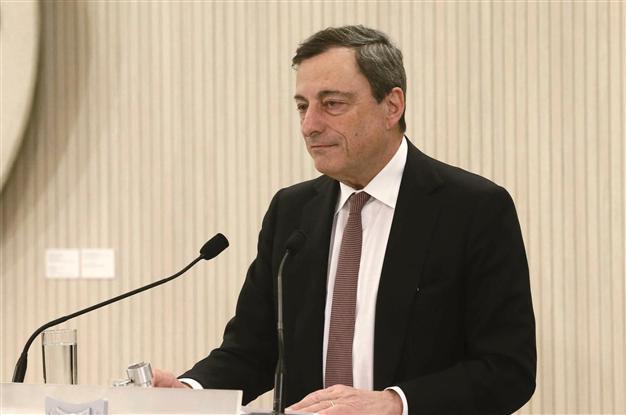ECB set to start bond purchases next week
NICOSIA/FRANKFURT

European Central Bank (ECB) President Mario Draghi gives a speech during a diner organized by Greek Cypriot President Nicos Anastasiades on March 4. AFP Photo.
The European Central Bank will launch into quantitative easing next week having increased its economic growth forecasts for this year and next.President Mario Draghi said the first bond purchases with new money would take place on March 9.
The eurozone’s central bank has said it will buy 60 billion euros a month until Sept. 2016 or until inflation is pushed backed towards a target of close to but below 2 percent.
The ECB, which left interest rates on hold at record lows just above zero at its meeting off-base in Greek Cyprus yesterday, lifted its growth forecast to 1.5 percent for this year, from the 1.0 percent it predicted in December.
For 2016, growth of 1.9 percent is now expected, up from a previous 1.5 percent.
“The latest economic data, and particularly survey evidence available up to February, point to some further improvements in economic activity at the beginning of this year,” Draghi told a news conference.
“Looking ahead, we expect the economic recovery to broaden and strengthen gradually.”
Long way to go: Draghi
An analysis of Reuters polls shows more than half the most important economic data reports from the euro zone since the start of the year have beaten the consensus forecast and many have topped the highest prediction.
Germany, Europe’s largest economy, has led the way.
Inflation, now running at -0.3 percent, is forecast at zero this year rising to 1.8 percent in 2017. That is sufficiently close to the ECB’s target to suggest money printing will not run beyond Sept. 2016.
The bank has a long way to go to convince markets its plans will be effective. Only half of the economists polled by Reuters think bond buying will help inflation rise towards the target of close to but below two percent and half think the purchases will be extended.
There are tentative signs inflation has bottomed out.
The February reading of -0.3 percent was above forecasts, oil prices have rebounded from January lows, growth is picking up and the euro hit a fresh 11-year low against the dollar overnight, boosting prospects for higher imported inflation.
“The risks surrounding the economic outlook for the euro area remain on the downside but have diminished following recent monetary policy decisions and the fall in oil prices,” Draghi said.
















